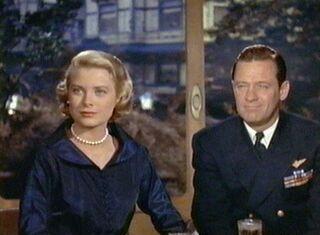The Bridges at Toko-ri
1955 US
Dir:Mark Robson
Stars:William Holden, Grace Kelly. Fredric March, Mickey Rooney
Left:Grace Kelly, Right:William Holden
There have been many motion pictures that have depicted crulety of war. The ways are various. For example,
there are such movies that fierce battle scenes are shown almost all over the entire length of the movie in question,
the most recent example of which is Ridley Scott's "Black Hawk Down". On the other hand, there are also
such kind of movies that alternate battle scenes with the scenes concerning the ordinary lives of the soldiers
who are to participate in the fierce battles, the typical example of which can be seen in Michael Cimino's famous
"Deer Hunter"(1978). In the first half of this movie, the peaceful lives of young persons are meticulously
depicted. In the latter half, they are conscripted and go to Vietnam, and finally the crazy Russian Roulette scene.
It's obvious that alternating battle scenes with the depictions of normal lives is more effective than just showing
cruel battle scenes when it is intended to convey the messages regarding the futility of war. "The Bridges
at Toko-ri" belongs to the latter category. In the first half of this movie, William Holden who plays a jet
pilot and Grace Kelly who plays his wife spend their precious time in a peaceful resort hotel in Japan. In the
latter half, Holden executes his mission to destroy five bridges situated on some strategically important location
in Korea and finally he is shot down and killed on ground by Korean soldiers along with Mickey Rooney and Earl
Holliman who have come to rescue him riding on a helicopter. I think this movie is quite clever. Not only because
it depicts the fierce and merciless battle scenes after the scenes depicting peaceful family reunion in a Japanese
resort hotel, but also because Holden is killed in an action of bombing the secondary target that is supposed to
be far easier than bombing the primary target, the five brideges at Toko-ri after he and his fellow jet pilots
have succeeded in destroying the primary target. If he was killed in an action of bombing the bridges that was
tenaciously fortified with dozens of anti-aircraft fires, he would surely be called a hero posthumously. But, a
jet pilot shot down in a fairly simple mission and eventually killed in a ground action after he has accomplished
far more difficult bombing mission that requires considerable bravery sounds rather awkward even if, in real wars,
there might have been plenty of such instances. You will surely wonder why and what for he had to be killed in
such a fashion and this will certainly conjure up in audience's mind the notion concerning futility of war. It's
clever and I guess in this regard the movie had to have been felt new at the time this film was made, and, even
today, I think it's not outdated. However, seen from today's view point, there is also an aspect that seems quite
outdated in this film. It goes without saying that the first half of the story where the family life of Willam
Holden is meticulously depicted is placed there with quite positive connotation in order to compare it with the
latter half where the futility of war is shown through the meaningless death of three American soldiers. But, today,
family life is seldom seen positively. Especially after the 1980s the begining of which was marked by the movies
like "Ordinary People"(1980), family life has been treated in movies with negative connotations, and
the fragmentation and scission of the family life seems to have since then been the main theme of drama movies.
For example, it can be said that "American Beauty" and "Traffic" are the recent examples embodying
this tendency. In such an era, the scene depicting happy life of William Holden's family looks quite naive; especially
such scenes like William Holden and Grace Kelly saying loudly to some Japanese family members literally "happy
family" in a public bath room. Today's audience might even be embarrassed watching such scenes as I am. Anyway,
this movie definitely have two aspects as I explained above; one is quite new, and the other is quite old. And,
although which aspect you shall feel much might decide your evaluation of this movie, I can say that the production
value of this movie is even today quite high and at least I think it is far better than recent war movies such
as the aforementioned "Black Hawk Down" in that without quite distracting physical violent scenes it
achieved certain amount of convincingness regarding the futility of war.

